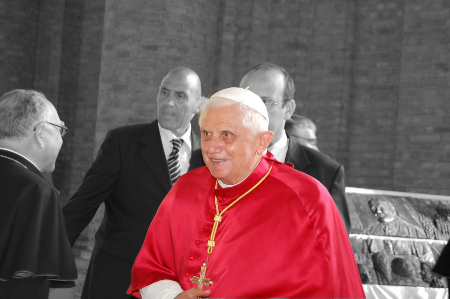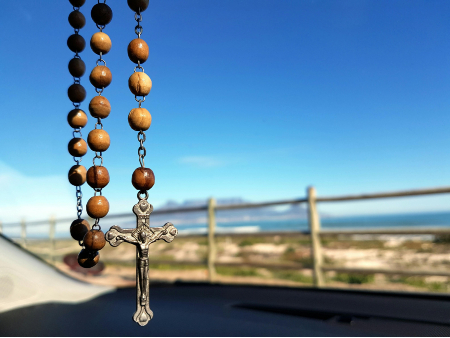We ask you, humbly: don't scroll away.
Hi readers, it seems you use Catholic Online a lot; that's great! It's a little awkward to ask, but we need your help. If you have already donated, we sincerely thank you. We're not salespeople, but we depend on donations averaging $14.76 and fewer than 1% of readers give. If you donate just $5.00, the price of your coffee, Catholic Online School could keep thriving. Thank you.Help Now >
Pope Benedict's 'Impelling Duty': Rebuild the Full and Visible Unity of the Church
FREE Catholic Classes
'To reunite all his children, scattered and led astray by sin, the Father willed to call the whole of humanity together into his Son's Church'.
Highlights
Catholic Online (https://www.catholic.org)
10/24/2009 (1 decade ago)
Published in Europe
CHESAPEAKE, Va. (Catholic Online) - On April 20, 2005 newly elected Pope Benedict XVI gave his first message at the end of a Mass he had concelebrated with the members of the College of Cardinals in the Sistine Chapel. He signaled his mission: "Nourished and sustained by the Eucharist, Catholics cannot but feel encouraged to strive for the full unity for which Christ expressed so ardent a hope in the Upper Room. The Successor of Peter knows that he must make himself especially responsible for his Divine Master's supreme aspiration. Indeed, he is entrusted with the task of strengthening his brethren (cf. Luke 22: 32). With full awareness, therefore, at the beginning of his ministry in the Church of Rome which Peter bathed in his blood, Peter's current Successor takes on as his primary task the duty to work tirelessly to rebuild the full and visible unity of all Christ's followers. This is his ambition, his impelling duty."
The announcement of October 20, 2009 that an Apostolic Constitution will establish a "Personal Ordinariate" for Anglican Christians and their Clergy to enter into the full communion of the Catholic Church while retaining elements of their distinctive Anglican identity is generating a lot of Press. Secular news sources have offered some interesting analysis. A Wall Street Journal article written by Stacy Meichtry was entitled ,"The Great Unifier?" Though worth reading, it is the Title which will endure. The question mark will fall away as this historic moment unfolds over the coming years. Pope Benedict XVI is indeed the "Great Unifier." The writer claims "Few expected Pope Benedict to reach out to other Christian churches aggressively when he was elected in April 2005". However, anyone aware of the writings, history and ecclesiology (theology of the Church) of Joseph Cardinal Ratzinger, now Pope Benedict XVI, knew this would happen. In fact, I believe he is only warming up.
A Wall Street Journal article written by Francis X. Rocca entitled "The Pope Lets a Thousand Liturgies Bloom" is also worth reading. The Vatican correspondent for the Religious news Service wrote: "It may seem ironic that Pope Benedict should be presiding over such diversification of worship. After all, as head of the Vatican's doctrinal office for more than two decades prior to his 2005 election as pope, then-Cardinal Joseph Ratzinger built a reputation as the church's most vigilant guardian of orthodoxy, receiving the nickname "God's Rottweiler." Benedict is hardly permissive when it comes to liturgy. ...Though even most Catholics are not aware of it, many sanctioned modes of worship have co-existed within the church over its 2,000-year history. The Ambrosian Rite, celebrated only in certain parts of northern Italy, with its own special prayers, vestments and type of chant, is one of the most ancient, dating back at least to the fourth century. Not to speak of the many Eastern Catholic Churches in full communion with Rome, which share a rich liturgical heritage with Eastern Orthodoxy."
Some in the "religious" Press, like Rod Dreher who writes for Beliefnet, are zeroing in on the other implications. Dreher was impressed by the excellent piece written by European Catholic Journalist Sandro Magister entitled "Knock, and It Shall Be Opened to You. As Long As It's According to Tradition." He discusses Magisters claim in his own analysis entitled "Pope Benedict's Brilliant Strategy." However, it is more than a strategy by this Pope, it is a mandate. Dreher has just discovered that this Pope really believes that the authentic Christian Tradition is not only about preserving the past and protecting orthodoxy and orthopraxy, but also about securing the path to the future. Many who have observed his ministry for years have known it all along. What is most heartening is that Dreher, a convert to Orthodox Christianity, encourages another aspect of the work of unity undertaken by this Pope, the full communion of the "two lungs" of the Church, East and West.
Dreher writes: "What a blessing it would be if he and the Orthodox patriarchs could come to an understanding that could pave the way for reunion. Personally, I don't see how it could be done, given the wide divergence between Orthodox and Catholic theology since the Great Schism. But with God, all things are possible -- and I think as a purely secular matter (that is, for the sake of establishing a united front for the preservation and growth of the faith against a de-Christianizing world), re-establishing communion between Eastern and Western Christianity would be great for both. Long may this pope -- and the ecumenism of tradition -- live and prosper!" I say "Amen to that!"
The authentic ecumenical mission, the full and visible unity of the Church, was at the heart of Pope John Paul's pontificate - and is at the heart of Pope Benedict's - because it is in the center of the heart of the Lord. "I pray not only for them, but also for those who will believe in me through their word, so that they may all be one, as you, Father, are in me and I in you, that they also may be in us, that the world may believe that you sent me." (John 17: 20, 21) The Servant of God John Paul II released an Encyclical Letter bearing that scripture as its official name Ut Unum Sint. The implications of that Encyclical Letter have not been grasped by many Catholics. One of my favorite theologians, an Orthodox Layman named Oliver Clement, took up one of the challenges in the Encyclical and wrote a gem of a little book in 1997 entitled "You are Peter: An Orthodox theologians Reflection on the Exercise of Papal Primacy."
We ask you, humbly: don't scroll away.
Hi readers, it seems you use Catholic Online a lot; that's great! It's a little awkward to ask, but we need your help. If you have already donated, we sincerely thank you. We're not salespeople, but we depend on donations averaging $14.76 and fewer than 1% of readers give. If you donate just $5.00, the price of your coffee, Catholic Online School could keep thriving. Thank you.Help Now >
In Catholic theology we teach what the early fathers, Saints and Councils throughout the ages have all affirmed; to belong to Jesus is to belong to His Body. Our membership in the Church is a participation in the life of God; what the Apostle Peter referred to as a "participation in the Divine nature". (2 Peter 1:4) We speak of our Christian friends in other Christian communities who have been validly baptized in accordance with a Trinitarian formula as already being in "imperfect communion" with the One Church. This is why Catholics do not "re-baptize" a Christian from another community who comes into the Catholic Church. We speak of them as coming into "full communion" because they are already joined to the one Church in an "imperfect" or incomplete communion.
The Church is not some "thing", outside of us, which we try to "fix" or have our "issues" with. The Church is not some human organization we created so that we could meet to study the Bible, support one another and do good works - as commendable as each of those endeavors may be. The Church is God's Plan. Jesus came to found that Church and begin the New Creation. It is a communion from above into which we enter through Jesus Christ. It is His Body. He is the Head and we are the members. Through our Baptism the Church becomes our home, our mother, the place in which we now live our lives in Christ. To perceive, receive and to live this reality requires a continuing and dynamic conversion brought about by grace, which is mediated to us through the Sacraments and, most especially through our Eucharistic communion. We are sons and daughters of the Church now. In living our lives within her we are enlisted in the mission of carrying forward in time the continuing work of Jesus Christ.
The Catechism of the Catholic Church, citing several ancient sources, states: "To reunite all his children, scattered and led astray by sin, the Father willed to call the whole of humanity together into his Son's Church. The Church is the place where humanity must rediscover its unity and salvation. The Church is "the world reconciled." She is that bark which "in the full sail of the Lord's cross, by the breath of the Holy Spirit, navigates safely in this world." According to another image dear to the Church Fathers, she is prefigured by Noah's ark, which alone saves from the flood. [St. Augustine, Serm. 96, 7, 9: PL 38, 588; St. Ambrose, De virg. 18, 118: PL 16, 297B; cf. already 1 Pet 3:20-21] [30, 953, 1219]" (#895)
This Church is both human and divine; thus her members still sin. Sometimes evil enters and rots her from within. Sadly, she has been divided, but that is not the Lord's Plan. She is the means through which all men and women are invited to participate in the life of God and find true unity. She is, as the fathers were fond of saying, "the world reconciled" and a seed of the Kingdom to come. To her has been entrusted the Sacraments (Mysteries), the Word of God, and the gift of a Teaching Office - Magisterium - through which Jesus Christ continues to speak through the Holy Spirit. The Church is not an optional "extra" that we add on to our lives, she is our life and we live our lives now in Christ. From His wounded side she was birthed at the tree of Calvary, the altar of the new world. Through faith we are invited into this mystery and by grace we come to more fully comprehend and live it as we respond to the ongoing call to conversion and newness of life.
Pope Benedict's 'Impelling Duty' is to rebuild the full and visible unity of this Church. It will be forged through orthodoxy (right teaching) and orthopraxy (right practice) but it will be lived within a legitimate diversity of expression within the One, Holy, Catholic and Apostolic Church. What happened last week is just the beginning.
---
'Help Give every Student and Teacher FREE resources for a world-class Moral Catholic Education'
Copyright 2021 - Distributed by Catholic Online










 Daily Readings for Wednesday, April 17, 2024
Daily Readings for Wednesday, April 17, 2024 St. Anicetus: Saint of the Day for Wednesday, April 17, 2024
St. Anicetus: Saint of the Day for Wednesday, April 17, 2024 Prayer to Love God above all Things: Prayer of the Day for Wednesday, April 17, 2024
Prayer to Love God above all Things: Prayer of the Day for Wednesday, April 17, 2024

